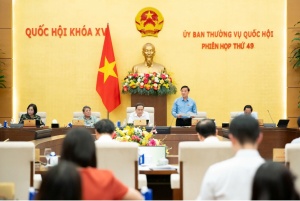INTERNATIONAL INVESTMENT
AND PORTAL
 Nhung Hong Pham, CEO of Banca IP Law firm
Nhung Hong Pham, CEO of Banca IP Law firm
A corporate brand name is like a person’s name – a marker of identity that affirms credibility. As such, a brand name represents an enormous intangible asset for a business.
For this reason, quite a few companies attempt to borrow someone else’s name. A notable recent trend is the borrowing of foreign brand names.
We were recently asked to file a trademark application for a company in the beauty sector. The striking detail was that the mark in question belonged to a foreign brand which that company had once intended to distribute in Vietnam, although the deal never materialised. We refused to assist with that trademark registration and advised our client to develop a brand of their own instead.
There have been numerous intellectual property disputes between foreign manufacturers and local distributors in Vietnam in recent years, particularly over trademark ownership.
A common scenario is that the foreign company fails to register its trademark in Vietnam promptly, while the distribution partner moves quickly to register it first. By the time the brand owner realises what happened, it’s too late – the foreign firm faces the risk of being deemed an 'infringer' of its own trademark.
Based on our experience, there are several unfortunate mistakes that foreign trademark owners frequently make:
Failing to register the trademark in Vietnam before partnering is the most common mistake. After entering a business partnership, many local distributors who sense a strong market opportunity will promptly file for trademark protection to seize ownership of the mark themselves.
Registering the trademark with an incomplete scope of protection is another mistake. Some companies do register their trademark but choose a protection scope that is too narrow, not covering all relevant classes of goods and services.
This leaves an opening for another party to file for the mark in the omitted categories and can create obstacles for the original business.
For example, in one case we handled, the foreign company had protected the mark for its product category, but a savvy local distributor registered that same mark for distribution and trading services in a different class.
Lacking clear trademark clauses in the distribution contract is also a common mistake. Many distribution agreements omit crucial restrictive provisions. They often fail to prohibit the distributor from registering or acquiring any identical or confusingly similar trademarks, and they do not specify penalties or damages if the distributor misappropriates the brand. Such contractual laxity creates a dangerous legal loophole for the brand owner.
These mistakes can expose foreign companies to serious legal risks in Vietnam. In some cases, a distributor has even purchased previously registered trademarks with names identical or similar to the manufacturer’s brand. They do this to legitimise their ownership and to prevent the rightful brand owner from registering the mark in Vietnam.
In fact, there was a case where a distributor used a trademark registration certificate they owned to request authorities to block the original manufacturer’s products. The imported goods were seized, and sales channels were frozen. The foreign company found itself having to defend itself as if it were an intellectual property infringer in Vietnam.
Once a trademark has fallen into the local partner’s hands, the legal path to reclaiming it is far from easy. The foreign company may have to file oppositions or request cancellation of the misappropriated trademark at Vietnam’s Intellectual Property Office, or even initiate a civil lawsuit in Vietnamese courts.
This process often drags on for years, incurs significant costs, and requires solid evidence to prove the partner acted in bad faith. During that time, the company’s business is put on hold and market opportunities are lost. The brand may also suffer reputational damage.
These risks are not just theoretical. Many companies have faced them in practice. Foreign firms have lost their trademarks in Vietnam, and conversely, Vietnamese firms have lost theirs abroad. One renowned Vietnamese coffee brand encountered major hurdles in the United States because it failed to register its trademark there in time.
A foreign partner quietly filed for that brand name in the US under their own name. As a result, the Vietnamese company became embroiled in a multi-year legal dispute to reclaim its own brand name on foreign soil.
The above lessons underscore the importance of proactive legal risk prevention from the outset. As legal experts, we recommend that foreign businesses establishing distribution in Vietnam register their trademarks in Vietnam as early as possible, covering all relevant product and service categories.
Ideally, a foreign company should complete its trademark registration in Vietnam before even negotiating or signing any distribution contract. Filing early secures priority rights and prevents any other party (whether a partner or a third party) from 'preempting' the brand.
Furthermore, the distribution contract should be crafted with specific binding terms regarding trademark ownership and use. The agreement must clearly stipulate that the distributor is prohibited from registering, appropriating, or acquiring any trademarks identical or confusingly similar to the owner’s brand.
The contract should also strictly forbid the distributor from selling counterfeit or knock-off goods or mixing non-genuine products under the brand name. Strict penalties for any such violations should be spelled out. A well-drafted contract serves as a strong legal 'shield', deterring any attempt to exploit the company’s brand.
Partnering with a local distributor offers great business advantages in the Vietnamese market, but it also comes with potential legal risks to that valuable asset – the trademark. Safeguarding trademark ownership is the key for foreign businesses to confidently expand their operations in Vietnam.
 Secret of success for FMCG brand building overseas
Secret of success for FMCG brand building overseas
Trademark protection and brand building is essential for local products to make a mark in global markets. Trung Trinh Hien and Thuy Thanh Do from Austrian-backed, Hanoi-based company Live Forever Young discussed the points that need to be noted to be successful in brand building overseas for fast-moving consumer goods segment.
 Vietnam ranks 44th in 2025 WIPO Global Innovation Index
Vietnam ranks 44th in 2025 WIPO Global Innovation Index
Vietnam has maintained 44th position in the global innovation ranking for 2025, according to the World Intellectual Property Organisation (WIPO).
 Vietnam amends Law on Intellectual Property
Vietnam amends Law on Intellectual Property
The amendments to the Intellectual Property (IP) Law aims to shift the focus from "rights protection" to assetisation, commercialisation, and marketing of IP rights (IPR), considering them as assets that can be valued, bought, sold, and mortgaged.



















